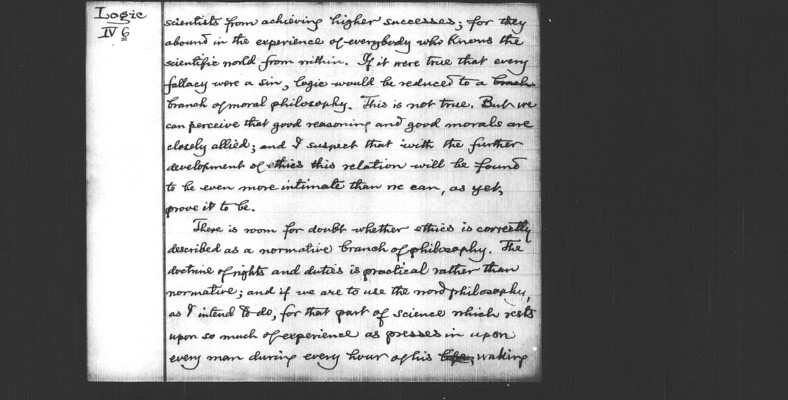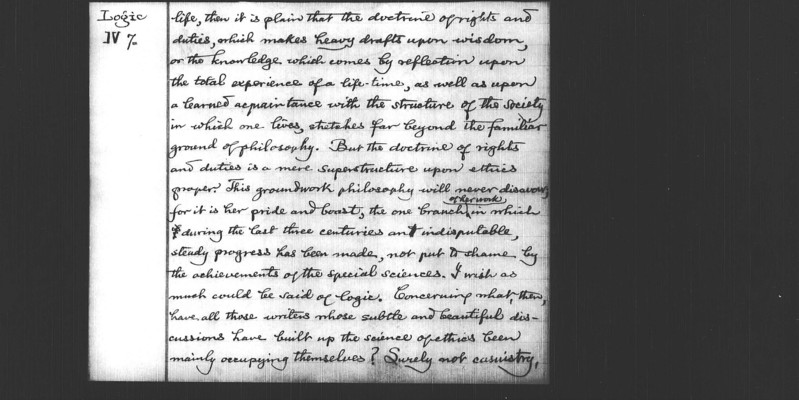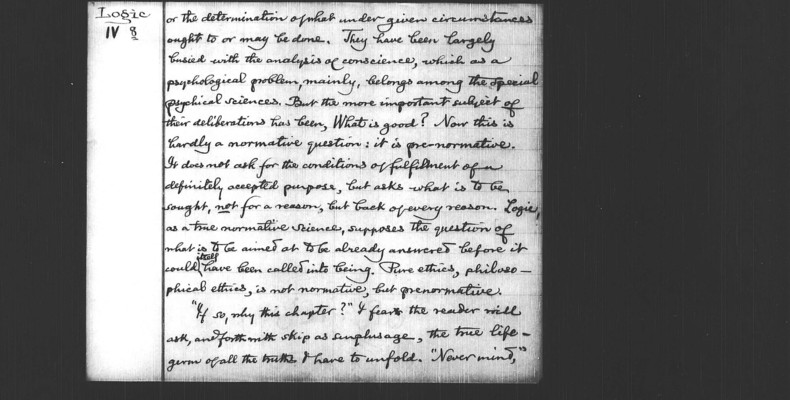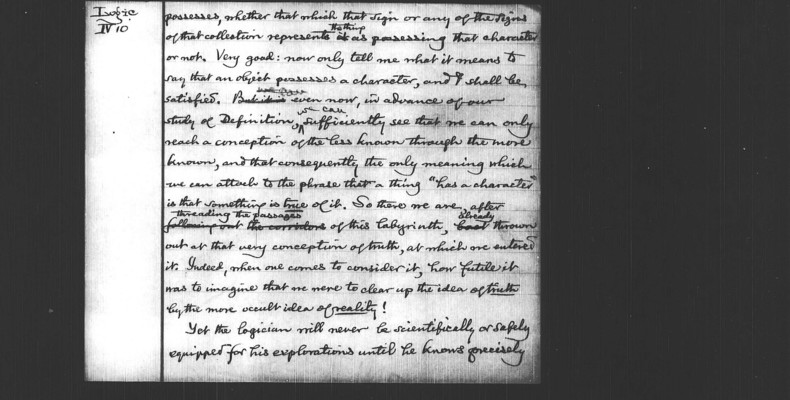Pages
6
Logic IV 6 scientist from achieving higher successes; for they abound int he experience of everybody who knows the scientific world from within. If it were true that every fallacy were a sin, logic would be reduced to a branch of moral philosophy. This is not true. But we can receive that good reasoning and good morals are closely aliled; and I suspect that with the further development of ethics this relation will be found to be even more intimate than we can, as yet, prove it to be. There is room for doubt whether ethics is correctly described as normative branch of philosophy. The doctrine of rights and duties is practical rather than normative; and if we are to use the word philosophy, as I intend to do, for that part of science which rests upon so much of expericne as [posesses?] in upon every amn during every hour of his waking
7
Logic IV 7 life, then it is plain that the doctrine of rights and duties, which makes heavy drafts upon wisdon, or the knowledge which comes by reflection upon the total experience of a life-time, as well as upon a learned acquaintance with the structure of the society in which one lives, stretches far beyond the familiar ground of philosophy. But the doctrine of rights and duties is a mere superstructure upon ethics prosper. This groundwork philosoply will never disavour; for it is her pride and [boast], the one branch of her work in which during the last three centuriesan indisputable, steady progress has been made, nor put to shame by the achievements of the special sciences. I wish as much could be said of logic. Concerning what, then, have all those writers whose subtle and beautiful discussions have built up the science of ethics been mainly occupying themselvew? Surely [nor or not?] [casuistry?]
8
Logic IV 8 or the determination of what under given circumstances ought to or may be done. They have been largely busied with the analysis of conscience, which as a psychological problem, mainly, belongs among the special psychical sciences. But the more important subject of their deliverations has been, What is good? Now this is hardly a normative question: it is pre-normative. It does not ask for the conditions of fulfillment of a definitely accepted purpose, but asks what is to be sought, nor for a reason, but lack of every reason. Logic as a true normative science, supposes the questions of what is to be aimed at to be already answered before it could itself have been called into being. Pure ethics, philosophical ethics, is not normative, but prenormative. "If so only this chapter?' I fear the reader will ask, and [forth?] [with?] skip and [surplus?] age, the true life [germ?] of all the truths I have to unfold. "Nevermind,"
9
Logic IV 9 you will say, "whether the aim which logic has is vein is a good one, or not; as a matter of fact, we are interested in it. It is to learn the truth: no aim could be of more elementary simplicity. Let us turn to where we are told how to come to it. " Well, if this aim is so readily comprehensible, suppose you tell me, to whom it does not seem so, what truth consists in. "Truther is the conformity of a representation to its object," say Kant. One might make this statement more explicit; but for our present purpose it may pass. It is nearly correct, so far as it is intelligible. Only what is that "object" which serves to define truth? Why it is the reality: it is of such a naure as to be independent of representations of it, so that, taking any individual sign or any individual collection of signs (such, for example, as all the ideas that ever enter into a given man's head,) there is some character which that thing
10
Logic IV 10 possesses, whether that which that sign or any of the signs of that collection represents the things as possessing that character or not. Very good: now only tell me what it mean to say that an object possesses a character, and I shall be satisfied. Even now, in advance of our study of Definition we can sufficiently see that we can only reach a conception of the less known through the more known, and that consequently the only meaning which we can attach to the phrase that a thing "has a character" is that something is true of it. So there we are after the reading passages of this labyrinth, already thrown out at the very conception of the trught, at which we entered it. Indeed, when one comes to consider it, how futile it was to imagine that we were to clear up the idea of truth by the more occult idea of reality! Yet the logician will never be scientifically or safely equipped for his explorations until he knows precisely




